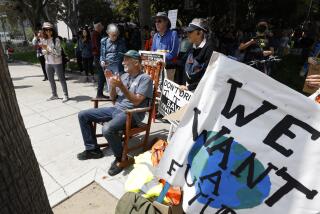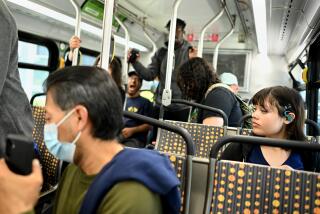Activists Pedal an Anti-Car Mantra
- Share via
PITTSBURGH — When the United States declined to ratify an international treaty that would impose limits on emissions of carbon dioxide and pollutants, four twentysomethings took action.
They formed Car Free Pittsburgh, which promotes walking, bicycling and public transportation. The group is part of the World Carfree Network, a loose-knit coalition of more than 40 groups that believe cars harm the environment, the economy and society.
The car-free movement is growing in the United States, although more slowly than in other countries. An estimated 100 million people participate in International Car Free Day each Sept. 22 in 1,500 cities worldwide, according to the Sierra Club and other groups.
But it’s not an easy sell, especially in an older, hilly city like Pittsburgh, one expert said.
“I think it would be an extremely difficult, if not miraculous, feat if organizations would be able to sway the general public, let alone the average Pittsburgher, to give up their cars,” said Audrey Guskey, a consumer trends expert from Duquesne University. “Instead of retreating from technology, we’re constantly grasping at it and seeking more of it.”
Nonetheless, the local group is asking drivers to pledge to use their cars less.
“In 20 years, I think the goal would be a society that doesn’t focus as much attention on and rely as heavily on the car,” said Katie Bombico, one of Car Free Pittsburgh’s founders. “Any small step is going to be a positive one.”
Although the Pittsburgh group’s founders bicycle or walk as much as possible, Bombico does drive. She said she used her car to drive to work and to visit her parents, who live five hours away.
“We realize, for many people, you just can’t jump into a car-free life,” Bombico said.
Steve Schmitt, director of the Bethlehem-based Coalition for Appropriate Transportation, said people weren’t motivated by the message that cars were responsible for ills ranging from obesity to suburban sprawl.
The group tried to get folks to stop driving one day in five and then one day a month, but both efforts failed. Schmitt said that was when the group decided to focus on educating people about transportation alternatives.
The World Carfree Network, based in Prague, Czech Republic, publishes “Car Busters” magazine and organized its fifth annual world conference this summer in Budapest, Hungary.
“It’s about people moving around by walking, by cycling, by public transportation,” said Randall Ghent, co-director of the network’s International Coordination Center. “Obviously, [the car] is not going to disappear overnight. But we strive for a society where its convenience is lowered and the convenience of these alternatives is raised.”
Cities including Montreal, Seattle, San Francisco and Chapel Hill, N.C., participate in the International Car Free Day, or sponsor their own during which residents are urged not to drive.
“There’s no guilt. We’re not like that. We’re not hard-core,” Chapel Hill Mayor Kevin C. Foy said. “But what it is supposed to do is expand your mind that you can do other things and it can be very pleasant to move around in other ways.”
Foy said Chapel Hill, neighboring Carrboro and the University of North Carolina invested in that idea. They operate a combined transit system with an annual budget of more than $12 million, serving about 6 million bus riders a year. The towns’ combined population is about 75,000, plus about 25,000 university students.
Ridership has doubled since the transit agency decided three years ago to make the service free. The cities recoup lost fares by not having to widen roads, build parking areas and other car-related infrastructure, Foy said.
Despite such success, Foy said it was hard to gauge the effect of International Car Free Day, though he said the effort was growing each year.
More to Read
Sign up for Essential California
The most important California stories and recommendations in your inbox every morning.
You may occasionally receive promotional content from the Los Angeles Times.













